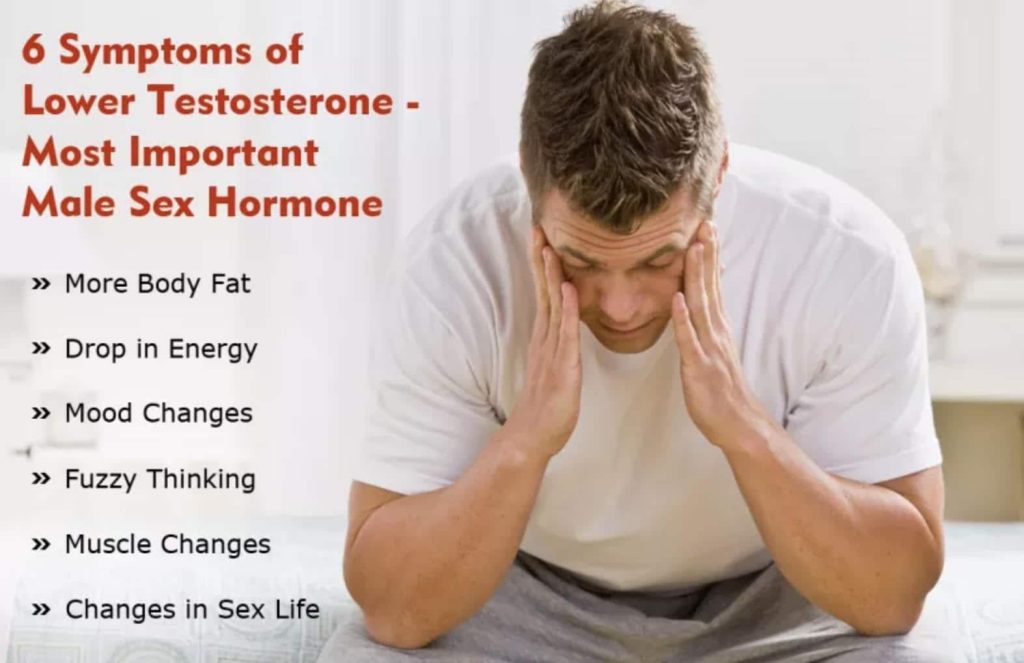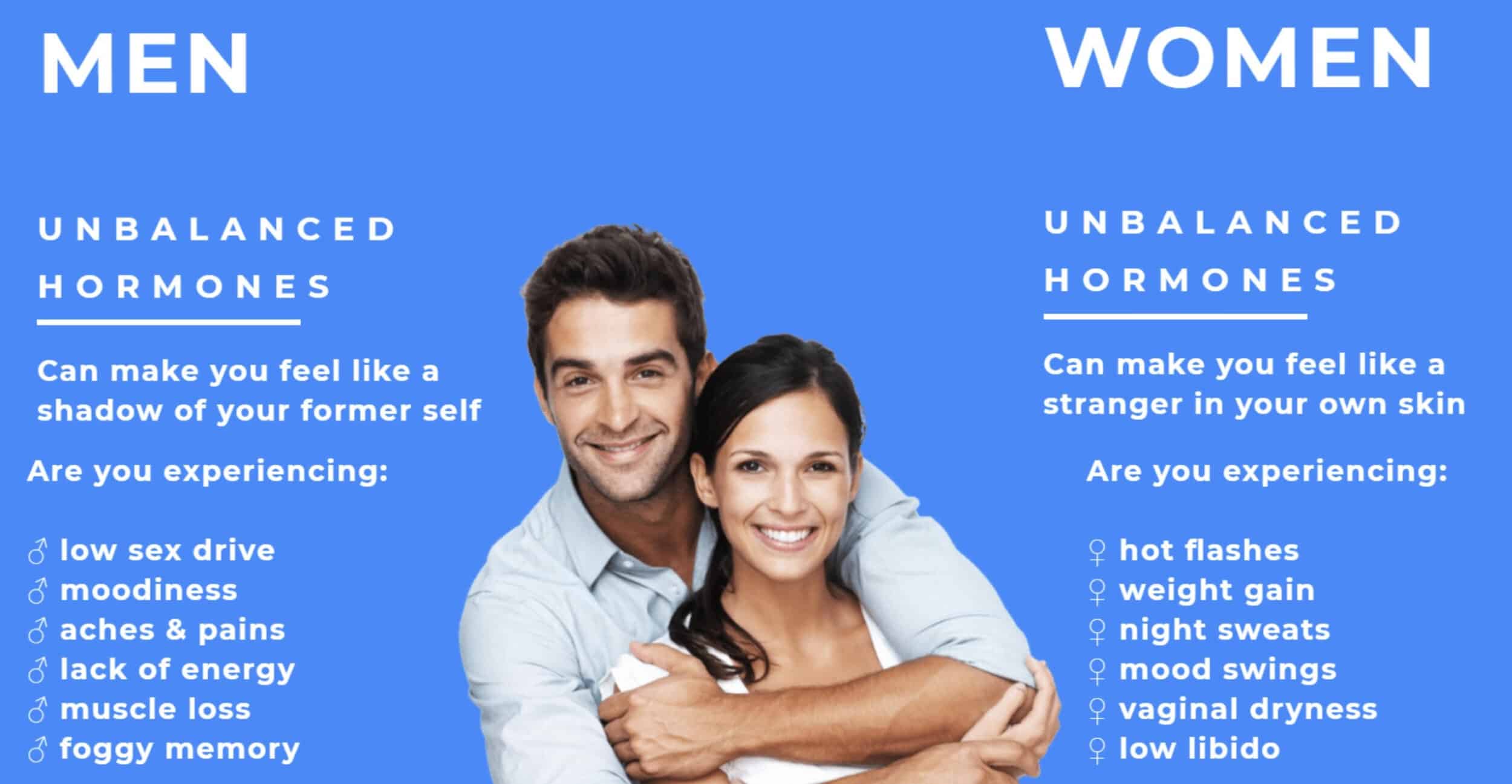Hormone Replacement In The Villages
Natural hormones, such as estrogen, progesterone, and testosterone, are produced in the body’s endocrine system.Hormones are your body’s chemical messenger system, and they have an enormous impact on your health and quality of life. The aging process starts to see a reduction in hormone production, leading to imbalances that cause several issues, including:
- Low libido
- Depression/Anxiety
- Irritability
- Memory Loss
- Fatigue
Some people experience deficiencies in their hormones that lead to difficult and unpleasant symptoms. And everyone experiences reduced hormone production as they get older, specifically in estrogen, progesterone, and testosterone. Hormone changes from both natural aging and imbalances can send you searching for solutions to unwanted symptoms. This is where hormone replacement therapy can help

What are the signs that you may need hormone replacement therapy, what are the risks, and how do you know if it’s right for you?
Signs of Normal Aging vs. Hormone Deficiencies
Men and women age differently, and their hormones are in different balances across their lifespans.
Age-Related Hormone Decline
Testosterone is the major sex hormone in males and plays a crucial role in the development of sex organs, body hair, musculoskeletal strength and development, sex drive, and sperm production. It may also play a role in mood regulation. Males produce the most testosterone when they’re young, peaking around age 20. After that, testosterone production declines throughout life. Females also have a level of testosterone that, when in balance with estrogen, maintains ovarian health, bone strength, sexual health, and mood regulation.
Unlike males, whose hormone levels gradually decline, females experience cyclic hormonal changes until they reach menopause. Menopause is a 6–18 month timeframe during which women experience a gradual loss of progesterone and estrogen production.
While age-related hormone decline is normal and not life-threatening, it can significantly impact your quality of life.
For women, menopause symptoms include hot flashes, weight gain, chills, night sweats, low libido, vaginal dryness, sleep problems, and changes in mood. The low estrogen brought on by menopause can also lead to osteoporosis, which increases the likelihood of bone fractures.
For men, declining testosterone can lead to hair loss, weight gain, muscle loss, fatigue, low libido, changes in mood, and osteoporosis.
Hormone Deficiencies
Certain medications, stress, steroid use, and other issues can also cause hormone deficiencies unrelated to aging in both men and women.
Signs of testosterone deficiency syndrome in males, for example, include fatigue, low libido, irritability, depression, loss of muscle, and erectile dysfunction. For females, declining estrogen levels before menopause can cause dry skin, tender breasts, weak bones, trouble concentrating, mood changes, vaginal dryness, night sweats, and irregular periods.
If you experience the signs of a non-age-related hormone deficiency, our providers can run tests and provide a diagnosis. Treatment might include hormone replacement therapy, or it might mean further investigation to address the root cause.
What Is Hormone Replacement Therapy?
Normal, age-related hormone decline isn’t fatal, but it will impact your quality of life. The purpose of hormone replacement therapy, then, is simply to improve quality of life.
Hormone replacement therapy (HRT) is designed to address hormone imbalances. Patients will receive personalized hormone replacement therapy designed to meet their specific deficiencies. State-of-the-art hormone testing allows our providers to identify your unique hormone needs. Our experts then discuss treatment programs designed to balance hormone levels. But before you begin hormone replacement therapy, you need to know whether it’s right for you and what the potential risks are.
Hormone Replacement Therapy Risks
For all the potential benefits of hormone replacement therapy, it isn’t a fountain of youth. Medical professionals are divided on whether they recommend it for patients, and while there’s no one right answer, you need to know the risks involved.
Some side effects are minor but undesirable, such as unwanted body hair in women taking testosterone, and some risks are more significant, like the ones listed below.
Dependency
When you use exogenous hormones, that is, hormones that aren’t produced by your own body, you risk creating a dependency on them. Please note: Dependency is not the same as addiction. But if you use hormone replacement therapy for longer than six to nine months, your body will become dependent on the exogenous hormones and you may have to be on hormone replacement therapy for the rest of your life. This is because hormone replacement therapy will suppress your own natural production. Having low natural production is still better than having no production at all after stopping exogenous hormones
Cardiovascular Risk
Both testosterone and estrogen replacement pose some cardiovascular risks. If you have a history of or risk for heart disease or stroke, you’ll need to carefully weigh the benefits of hormone replacement therapy against the potential downsides with your provider.
Cancer
Aggressive prostate cancer is a risk associated with testosterone replacement therapy. The testosterone doesn’t cause the cancer, but if prostate cancer develops, the added hormone pours fuel on the fire. And while estrogen can improve the symptoms of menopause, taking estrogen alone (without progesterone) can increase the risk of uterine cancer.
The Only Defense Against Menopause
For women, hormone replacement therapy is really the only option to address the declining estrogen and progesterone of menopause. There aren’t any lifestyle hacks to help women naturally boost their estrogen or progesterone levels. So if the symptoms of menopause disrupt your quality of life too greatly, it might be a sign that you should consider hormone replacement therapy.

5 Signs Hormone Replacement Therapy Will Improve Your Quality of Life
While the five signs below don’t necessarily mean you need hormone replacement therapy, they could indicate that hormone replacement therapy will significantly improve your quality of life.
If you experience any of the following symptoms to a disruptive degree, it’s a good idea to speak with your provider.
1.Increased Fatigue
The number one issue many people experience with age is fatigue. On the one hand, fatigue is considered a normal part of growing older. On the other hand, you can experience significant fatigue because of hormone decline. This affects men and women both, but especially men. And adequate treatment with hormone replacement therapy could help alleviate that. The only way to find out whether your fatigue is due to hormones is to check your hormone levels.
2.Decreased Sexual Function, Libido, Desire
If you experience a loss of interest in or ability to have satisfying sexual interactions, it might be a sign you could benefit from hormone replacement therapy. Testosterone is a major driver of libido for both men and women. When it naturally declines as we age, our desire can go with it. This is why men with erectile dysfunction only benefit from well-known drugs like Cialis or Viagra if there’s already a healthy level of testosterone in the body. Hormone replacement therapy with testosterone can help boost libido for men and, in small amounts, for some women as well. Additionally, women going through menopause or experiencing other hormone imbalances might experience vaginal dryness or pain during intercourse. A small amount of topical estrogen could alleviate these symptoms and help renew interest in intimacy. With frequent lab work and medical supervision, hormone replacement therapy could help get your libido back on track.
3.Mood Shifts
If you or a loved one have noticed a drastic change in your mood, or if you just haven’t been feeling like yourself, it might be time to check your hormones. Hormone imbalances can greatly affect your mood, causing depression, anxiety, poor concentration, and more. Hormone replacement therapy may help you feel more like yourself again. Additionally, if your mental health is being treated by a medical professional and isn’t improving despite therapy and medication, it’s worthwhile to look at your hormones. Medications won’t be able to provide much help until you get a healthy foundation of proper hormone levels.
4. Inadequate Sleep
Adequate sleep is an incredibly important component of health and contributes to your quality of life. But a hormone imbalance can cause your sleep to suffer. For men, testosterone replacement therapy can benefit their sleep architecture and improve restful sleep. For women going through menopause, balancing their hormones can help alleviate sleep disturbances like hot flashes so they can get some rest at night.
5. Changes in Body Composition
As we age and our hormones change, our body composition also changes. We lose muscle mass and bone density. Our bodies accumulate more fat and redistribute it to new areas. Our skin also becomes thinner and drier, especially in women. And both men and women can experience hair loss. If you notice these types of body changes taking place and are experiencing quality of life issues, they could be a sign that you need hormone replacement therapy

